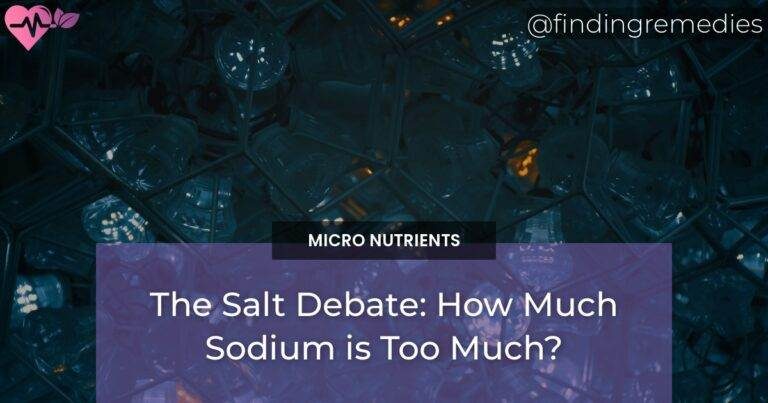As a vital nutrient, sodium plays a significant role in our overall health. However, the debate over the appropriate amount of sodium intake has long been a topic of discussion among nutrition experts and health professionals. With the increasing prevalence of chronic diseases such as high blood pressure and heart disease, the question remains: how much sodium is too much? In this comprehensive article, we will explore the role of sodium in electrolyte balance, the risks of overconsumption, dietary guidelines, and the ongoing salt debate.
Table of Contents
Exploring the Role of Sodium in Electrolyte Balance
What is Sodium?
Sodium is an essential mineral that is found in many foods we consume daily. It is a key electrolyte, along with potassium and chloride, responsible for maintaining fluid balance and regulating nerve and muscle function in the body. Sodium is also involved in the absorption of other nutrients, such as glucose and amino acids.
How Does Sodium Affect Electrolyte Balance?
Electrolytes are crucial for maintaining fluid balance in our bodies. Sodium, in particular, plays a significant role in this process by helping to regulate the amount of water in our cells. When sodium levels are too high or too low, it can disrupt this delicate balance and lead to health issues.
The Importance of Electrolyte Balance in the Body
Electrolyte balance is essential for proper bodily functions, including muscle contractions, nerve impulses, and maintaining blood pressure. When electrolytes, including sodium, are not in balance, it can lead to dehydration, muscle cramps, and even life-threatening conditions.
Risks of Overconsumption
Health Risks Associated with High Sodium Intake
While sodium is a necessary nutrient, consuming too much of it can have negative effects on our health. High sodium intake has been linked to an increased risk of high blood pressure, heart disease, stroke, and kidney disease. It can also contribute to bloating and weight gain.
ALSO READ
The Link Between Sodium and High Blood Pressure
High sodium intake is a well-known risk factor for high blood pressure, which is a significant risk factor for heart disease. When we consume too much sodium, our bodies retain water, leading to increased blood volume and pressure on our blood vessels. Over time, this can damage our blood vessels, making them less elastic and increasing the risk of heart disease.
Other Health Concerns Related to Excessive Sodium Intake
In addition to high blood pressure, excessive sodium intake has been linked to other health concerns. It can increase the risk of osteoporosis, stomach cancer, and cognitive decline. It can also worsen symptoms of asthma and contribute to the development of kidney stones.
Dietary Guidelines
Recommended Daily Sodium Intake
The Dietary Guidelines for Americans recommend limiting daily sodium intake to less than 2,300 milligrams (mg) for adults and children over the age of 14. For those with preexisting conditions such as high blood pressure, diabetes, or kidney disease, the recommended daily limit is 1,500 mg or less.
Sources of Sodium in the Diet
Sodium is naturally found in many foods, including vegetables, meats, and dairy products. However, the majority of our sodium intake comes from processed and packaged foods, such as canned soups, chips, and frozen meals. Eating out at restaurants can also contribute to high sodium intake due to the added salt in dishes.
Tips for Reducing Sodium Intake
To reduce sodium intake, it is essential to read food labels carefully and choose lower sodium options when possible. Additionally, cooking at home with fresh ingredients and limiting the use of salt in recipes can significantly reduce sodium intake. Using herbs and spices to add flavor instead of salt can also be a healthier alternative.
The Salt Debate
Different Perspectives on Sodium Intake
The debate over sodium intake centers around the question of whether the recommended daily limit is too low or too high. Some argue that the current guidelines are too low and that consuming moderate amounts of sodium is not harmful. Others believe that even lower amounts of sodium should be recommended to reduce the risk of chronic diseases.
The Controversy Surrounding Low Sodium Diets
Skeptics of low sodium diets argue that reducing sodium intake too much can lead to health issues such as low blood pressure, dizziness, and fatigue. They also claim that there is no evidence to support the benefits of low sodium diets in reducing the risk of chronic diseases.
Finding a Balance: The Role of Individual Needs
While the debate over the appropriate amount of sodium intake continues, it is essential to understand that individual needs may vary. Some people may benefit from a lower sodium intake, while others may need more sodium to support their electrolyte balance. It is crucial to listen to your body and work with a healthcare professional to determine the appropriate amount of sodium for your needs.
Does Drinking More Water Impact Sodium Intake and Health?
Drinking more water can actually help regulate sodium intake and improve overall health. By sipping water for health, you can naturally flush excess sodium from the body and prevent high blood pressure and other related health issues. Staying hydrated is essential for maintaining a healthy balance of sodium in the body.
Conclusion
Sodium is an essential nutrient that plays a crucial role in our overall health. However, consuming too much sodium can have negative effects on our health, including an increased risk of chronic diseases. While the debate over the appropriate amount of sodium intake continues, it is essential to follow the recommended guidelines and listen to our bodies’ individual needs. By doing so, we can maintain a healthy balance and support our overall well-being.
RELATED ARTICLES:

